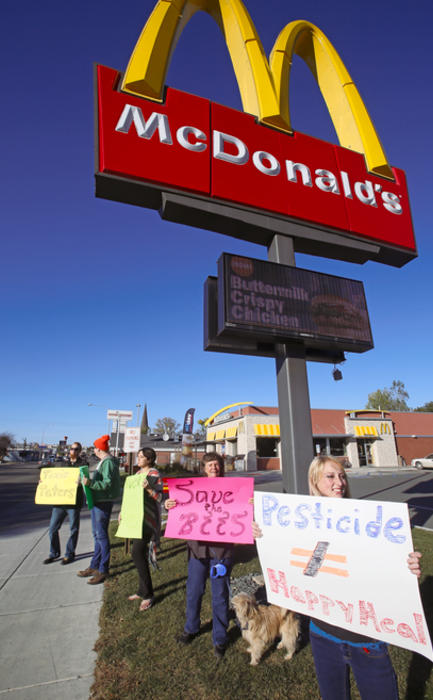
Groups Join to Protest Pesticide Use on Potatoes Grown Locally for Minnesota McDonald’s
MOORHEAD, Minn. -- Local organic farming supporters and pesticide protesters picketed Tuesday at the McDonald's restaurant in Moorhread and in several other cities in Minnesota and around the nation in an effort to let the fast-food mega-chain and its suppliers know they "aren't lovin' it" when it comes to pesticide overuse and drift from potato-growing operations.
"I just hope to bring awareness to how many pesticides and herbicides are being put into our foods and don't need to be," said Adam Hasbargen, a Minnesota State University Moorhead graduate, who along with several others waved signs at drivers along Eighth Street South during the evening rush hour.
October 6, 2015 | Source: Grand Forks Herald | by Helmut Schmidt
MOORHEAD, Minn. — Local organic farming supporters and pesticide protesters picketed Tuesday at the McDonald’s restaurant in Moorhread and in several other cities in Minnesota and around the nation in an effort to let the fast-food mega-chain and its suppliers know they “aren’t lovin’ it” when it comes to pesticide overuse and drift from potato-growing operations.
”I just hope to bring awareness to how many pesticides and herbicides are being put into our foods and don’t need to be,” said Adam Hasbargen, a Minnesota State University Moorhead graduate, who along with several others waved signs at drivers along Eighth Street South during the evening rush hour.
“When you have to put on a suit to apply chemicals, that can’t be good,” said Hasbargen, who added, “We need to go back” to healthier farming practices. “I’d pay a premium (for organic). You can do it.”
“I go as much non-GMO (genetically modified organisms) and organic as I can,” said Moorhead resident Lindsey England. “It’s what we’ll buy that makes a difference” in what is sold.
England said that philosophy is important when it comes to what we feed our children. If people are unwilling to help themselves, “at least help for the young ones.”
The protests coincided with the national rollout of all-day breakfast for McDonald’s.
Central and northwestern Minnesota is prime potato-growing country and Fargo-based R.D. Offutt Co. is one of the biggest suppliers of spuds in the region for McDonald’s french fries and hash browns, said Amy Mondloch, coordinator for Toxic Taters.
The Comstock-based advocacy group, along with the Minnesota Public Interest Research Group, Pesticide Action Network and other groups, organized the rallies.
Mondloch was protesting in Perham, and planned to go to Wadena and Detroit Lakes, too.
Toxic Taters is a grass-roots organization that formed in 2013 after years of efforts by local activists, Mondloch said.
A typical meeting may have a dozen attendees, but many other people join protests and information events, she said.
Last year, the group gathered 20,000 signatures to encourage McDonald’s to tell potato growers to cut down on pesticide use, she said.
The issue is personal for Mondloch.
“I grew up on a farm in Wisconsin. In the area I was farming, we often saw the pesticide planes going over. On the road where I grew up, there were three women living on that mile of road, and all three died of cancer within a few years of each other. That really affected my life,” Mondloch said.
“Ever since then, I have never wanted to see another child go through that,” she said. “One of those women was my mom.”
Mondloch said many of the people in Toxic Taters got involved because they’ve been sprayed themselves.
“We have folks that have lost livestock, who have gotten sick, who’ve known people who have died of cancer, who’ve gotten many other diseases caused by pesticides, and they’re tired of it,” she said.
At Concordia College, Joleen Baker, treasurer of the Student Environmental Alliance, spent part of her afternoon in the Knutson Campus Center handing out literature and talking about cutting back on pesticides.
“We’re kind of in an interesting situation because we receive a lot of money from Ron Offutt,” the chairman and founder of R.D. Offutt Co. and the lead donor for the creation of Concordia’s Offutt School of Business, Baker said.
Baker, who works on a small organic farm, said many people who live near potato fields and are affected by chemical overspray have lower incomes.
“It’s a social justice issue, definitely, not just environmental, and that can’t be overlooked,” she said.
Erik Hatlestad of MPIRG was also at Concordia.
“I think we have a pretty unique opportunity with students in Moorhead who do care how their food gets produced,” Hatlestad said. “It’s important for (Ron Offutt) and the the larger agricultural system as a whole to listen to young people and their concerns about the world.”
A McDonald’s spokeswoman said the firm remains committed to reducing pesticide use.
“As part of our 2009 commitment, we require a comprehensive audit of U.S. potato growers annually to identify best practices in pesticide reduction, as well as water and fertilizer use,” said Becca Hary, a director of global media relations for Oak Brook, Ill.-based McDonald’s.
“We’ve seen progress towards a more diligent approach to the use of all inputs, including pesticides. Together with our suppliers we will continue to make progress on this journey.”
